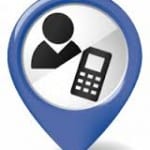 When it comes to “mobile as identity” – the notion that someone’s mobile phone serves as a digital proxy for his or her personal identification — there are few companies in the world that can claim as much R & D investment, senior management expertise and intellectual property as Finsphere Corporation.
When it comes to “mobile as identity” – the notion that someone’s mobile phone serves as a digital proxy for his or her personal identification — there are few companies in the world that can claim as much R & D investment, senior management expertise and intellectual property as Finsphere Corporation.
It was precisely because of the company’s strengths in “mobile as identity” that Visa, Inc. chose Finsphere to empower its new Mobile Location Confirmation (MLC) service that was announced February 12.
MLC uses Finsphere’s mobile geo-location technology combined with multiple information sources to predict more reliably whether the actual cardholder or an unauthorized user is attempting to make a payment with a Visa card. That determination is key to avoiding the unneeded and unwanted embarrassment and delays that confront merchants, cardholders and card issuers worldwide when legitimate transactions are denied for suspected fraud.
Finsphere CEO Michael Buhrmann said Visa’s MLC represents the first major commercial application of the “mobile as identity” concept. On a global basis, the value of this type of confirmation to banks and other issuers of credit and debit cards is estimated to exceed $3 billion annually for their handling of legitimate transactions that are denied unnecessarily because of suspected fraud.
In addition to Visa’s validation of its leadership position in “mobile as identity,” Finsphere has had a digital geo-location partnership of longstanding with Vodafone Group PLC, one of the world’s largest telecommunications services companies, which provides wireless services to some 434 million people around the globe.
“‘Mobile as identity’ was the reason we started the company in 2007,” said Buhrmann. “We had a simple, yet powerful vision – your mobile phone is a proxy for your identity.”
“Here’s why: Global telecommunications standards enforce a unique one-to-one relationship between each subscriber’s mobile phone number and that person’s physical mobile handset,” he said. “That relationship is secure and difficult to compromise. The concept of ‘one number, one phone’ is what makes ‘mobile as Identity’ a unique and unmatched means to authenticate individuals.”
 “Our team has spent more than six years building Finsphere’s patented identity authentication platform and services around this central belief,” Buhrmann said. “Today, we offer a flexible location-based, precision-analytics engine that is highly effective in solving real-world, digital- identity-management problems in simple, safe and secure ways for banks, retailers and the card-using consumer. Our technology works with either network or mobile app location data.”
“Our team has spent more than six years building Finsphere’s patented identity authentication platform and services around this central belief,” Buhrmann said. “Today, we offer a flexible location-based, precision-analytics engine that is highly effective in solving real-world, digital- identity-management problems in simple, safe and secure ways for banks, retailers and the card-using consumer. Our technology works with either network or mobile app location data.”
Buhrmann added: “More important is that Finsphere’s non-intrusive approach does not require cardholders to remember passwords or PINs, respond to transaction-verification calls or to text messages, receive one-time-passwords, carry physical tokens or perform any additional action that interferes with typical financial transactions or access events as they are performed today.”
Buhrmann noted that Finsphere’s executive team has extensive experience in fraud-prevention technology development in the financial services industry and that the company holds 11 patents in the “mobile as identity” area, including six in the United States. [24×7]




















